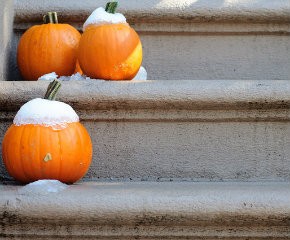Beauty and thanksgiving
One fall years ago, my mother sent me a copy of “God’s World,” by Edna St. Vincent Millay. It was her favorite poem, and she read it every autumn when western Pennsylvania mountains were bursting with vivid red, gold and brown color against the green pines.
O world, I cannot hold thee close enough! . . .
Thy woods, this autumn day, that ache and sag
And all but cry with colour! . . .
Lord, I do fear
Thou’st made the world too beautiful this year.
Now I’m the one who reads the poem every autumn. There are no mountains in Chicago, but from my 11th-floor window in the Century office I see two long rows of brilliant red maples in Millennium Park, surrounded by other trees beginning to turn from green to yellow.
The poem reminds me of the beauty and fundamental goodness of the world. “Nein!” was Karl Barth’s response when Emil Brunner suggested that there is grace in the natural world. I had a hard time with Barth’s argument when the reading was assigned 50 years ago, and I still do.
I’m not the only one. Many people say that they first became aware of the sacred while in nature. I find it impossible to see the brilliant colors of autumn or the snow-covered peaks of the Grand Tetons and not experience something of the Holy. I’ve never bought the Greek dichotomy between evil matter and good spirit, even when vacation Bible school teachers were telling me the world was a sinful, evil place. I’ve always loved the world and believe that creation is good. Christianity is not otherworldly. It is worldly, earthy, sensual.
Christian Wiman commented on this topic in an interview with Krista Tippett. “I was brought up with the poisonous notion that you had to renounce love of the earth in order to receive the love of God. My experience has been just the opposite: a love of the earth and existence so overflowing that it implied, or included, or even absolutely demanded, God.”
For me, the proximity of American Thanksgiving and Advent evokes an awareness and celebration of the ways God comes into the world: the steady rhythms of nature with occasions of surprising beauty, the life force, the mystery of human birth, the simple fact of our being in the world.
Some of us need help in seeing this. Life is busy, days are full, calendars are crowded. I may miss what’s in front of my eyes, not because my eyesight is deficient, but because I’m distracted. I’m grateful for people who see more than I do and slow me down, as does Mary Oliver in her poem “Praying”:
It doesn’t have to be
the blue iris, it could be
weeds in a vacant lot, or a few
small stones; just pay attention . . .
I was in Wyoming recently, and I was startled by the beauty of the Tetons, those high, rugged, snow-capped mountains that seem to shoot up out of the rugged terrain. We were driving out of Jackson Hole when someone in the car pointed out a small herd of elk grazing not more than 50 yards away, almost invisible against the gray-brown trees. We pulled off the road and watched. After a minute or so, a huge bull elk with a magnificent rack of antlers emerged out of the woods. He moved with dignity and grace. I said out loud, “Thank you.”






